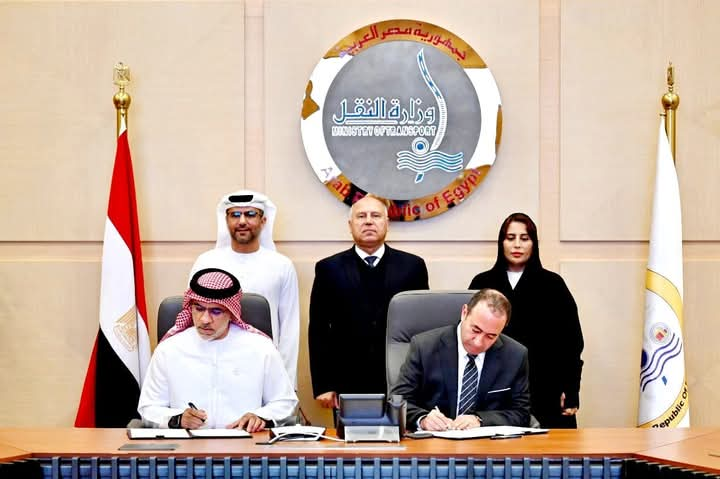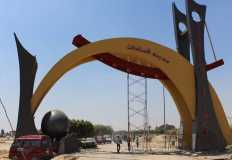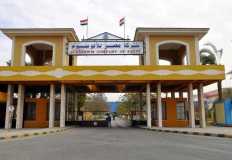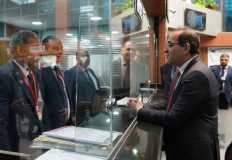
Engineer Kamel El-Wazir, Deputy Prime Minister for Industrial Development, Minister of Industry and Trade, and Minister of Transport, witnessed the signing of a memorandum of understanding (MoU) between the Holding Company for Maritime and Land Transport, one of the companies of the Ministry of Transport, and Abu Dhabi Ports Group, regarding the development and expansion of a logistics zone in the Port of Alexandria.
Maryam Al Kaabi, UAE Ambassador to Cairo, Mohammed Al Shamsi, Managing Director and CEO of Abu Dhabi Ports Group, Major General Nihad Shaheen, Deputy Minister of Transport for Maritime Transport, Major General Ahmed Hawash, Chairman of the Alexandria Port Authority, and Engineer Mohamed Fathi, Assistant Minister for Maritime Transport, were present.
The MoU was signed by Dr. Amr Moustafa,
Executive Managing Director of the Holding Company for Maritime and Land
Transport, and Captain Ahmed Ibrahim Al-Mutawa, Regional CEO of Abu Dhabi Ports
Group.
The Deputy Prime Minister
emphasized that this signing aligns with the Ministry's comprehensive plan to
modernize Egypt's maritime transport system and seaports. This initiative aims
to establish Egypt as a regional hub for transportation, logistics, and transit
trade, in accordance with the directives of President Abdel Fattah El-Sisi.
This effort is also underpinned by the Ministry of Transport's comprehensive
plan to establish 32 dry ports and logistics zones across the country.
He highlighted the significance
of the logistics zone project within the Port of Alexandria. Covering 273 acres
in the first phase and expanding to 600 acres in the second, this zone will
accommodate a diverse range of industries and activities related to maritime
transport, including complementary and value-added sectors. Notably, the
container industry, a key focus for the Egyptian market, is slated for
introduction within this zone.
He added that the zone will
witness the primary activity of import and export storage, customs deposit, and
re-export, as well as the secondary activity of packaging, simple manufacturing
of agricultural products, small-scale processing industries, as well as simple
industries based on some oils imported in large containers and tanks, and all
value-added industries that contribute to improving the product, whether
imported or exported.
He pointed out that the third
activity of these industries that the logistics zone will witness is the
manufacturing of blanks such as cardboard, sacks, and 20 and 40-foot
containers, adding that quality control and ensuring the suitability of
imported and exported products from this zone is the fourth of these
activities, and is a very important activity to ensure the absence of defects
in these materials and their compliance with global quality standards,
stressing that this zone will have an exchange station in the Ameriya area
connected to the high-speed electric train, as well as with the (Manshiyya -
Ettehad - Qabary) railway line to transport goods and products to all parts of
the republic.
It is noteworthy that the logistics zone within the Port of Alexandria plays a crucial role within the integrated Sokhna-Alexandria international logistics corridor. This zone is instrumental in optimizing the corridor's operations, thereby supporting the government's vision of establishing Egypt as a regional hub for transportation, logistics, and transit trade, while simultaneously fostering its emergence as a regional manufacturing center.





